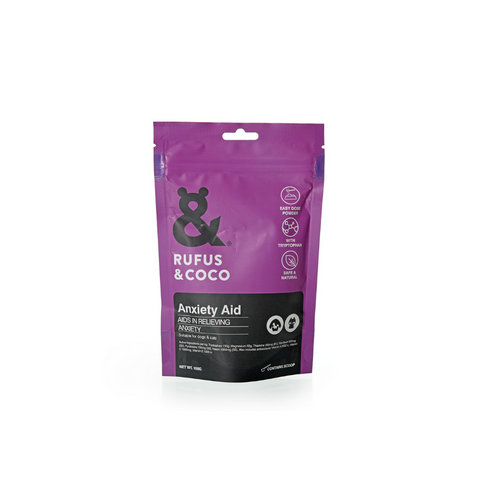10 Dog Breeds Prone to Anxiety and How to Help Them
- by Rufus and Coco
Anxiety affects dogs as much as it does people, but can be more common to particular breeds. While it may sometimes never be cured, it can be managed and is something that pet owners should definitely have a better understanding of.
The dog breeds that are more likely to have this problem are the German Shepherd, Australian Shepherd, Border Collie, Jack Russell Terrier, Cavalier King Charles Spaniel, Bichon Frise, Toy Poodle, Labrador Retriever, Cocker Spaniel, and German Shorthaired Pointer.
In these breeds and others, anxiety can have different manifestations - from barking and whimpering to whining all day long, especially when you’re out of the house or when you leave your pooch alone. Some dogs can become destructive, while others can be withdrawn.
The most common causes of canine anxiety are fear of abandonment, travelling, loud noises, or being in the company of strange animals or people. In this article, we list down a few ways in which you can better manage your pet’s anxiety level.
5 Tips to Alleviate Your Dog’s Anxiety
Change your routine
Before making any drastic decisions or jumping into conclusions, try to think of any sudden routine changes that might have influenced your dog's anxiety level. If you tend to be away from home for ten hours a day, your dog might need to be cared for by someone, such as a dog sitter, or they might have to be taken out for walks by a dog walker in your absence.
Dogs thrive on routine, but spending time with their owners, other people, and sometimes even other pets, help them feel more at ease with the world around them and themselves.
Soothe your dog with music and a massage
As you probably know by now, there’s nothing that a dog loves more than getting attention from their pet parent. Physical contact can considerably improve your dog’s nervousness, especially if something daunting like a visit to the animal hospital is about to happen.
Give your dog a hug and pet them for several minutes. A massage would surely do wonders for the both of you as well. Just looking at your dog’s face while you do this is likely to improve your mood, too.
You can also use pet music for your mate’s anxiety. Many dogs seem to be classical music aficionados, especially since it calms them down. You do not have to go out of your way for this -- just look up dog music on sites like YouTube, and you’ll quickly come across several playlists.
Get professional help
A pet behaviourist can help you better understand what’s triggering your dog’s anxiety. They can also give you advice on how you can improve your living space to potentially help with your dog's mood.
Ask your vet about animal behaviourists that they would recommend. Chances are that your vet, who is already aware of the pathological problems that your dog might have experienced in the past, can guide you in the right direction.
Use pet calming products
There are several options these days when it comes to alternative therapies. You can use supplements, such as our Rufus & Coco Anxiety Aid, which is a healthy combination of amino acids, vitamins, and minerals, all of which contribute to your dog feeling better.
You can also purchase an anxiety vest or jacket, which would keep your dog snug and tightly ‘hugged’ as if you were to soothe your pet right in your arms.
Essential oils are somewhat problematic when it comes to pets because not all of them are safe. However, geranium and chamomile are among those that you can use to calm your dog down when they’re feeling particularly nervous. Simply add them to your diffuser several times throughout the day.
Exercise
Not only do dogs hate being cooped up indoors for many hours, especially if they’re a hunting or herding breed, but they also need exercise to stay healthy.
These pets are not made to sit around and sleep all day long, something that cats would love, for example. They have to be taken out for walks, and once every several days, they need a lengthy play session in the park or in your yard.
Final thoughts
Some dogs can be born anxious, so you will have to take on the responsibility of improving their quality of life as much as possible. But there are dogs that become anxious because of various factors, so it should be your goal to discover these triggers and do your best at eliminating them.
In the end, creating a meaningful bond and making your dog trust you as their pet parent is what’s important.
- Posted in:
- behaviour
- dog
- health-tips
- how to help
- tips






